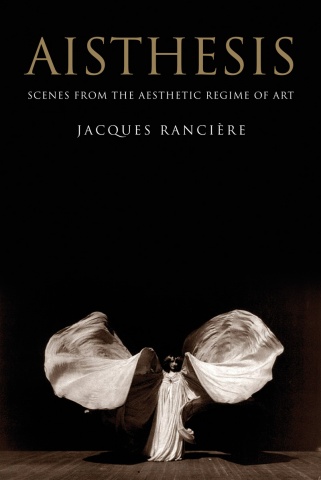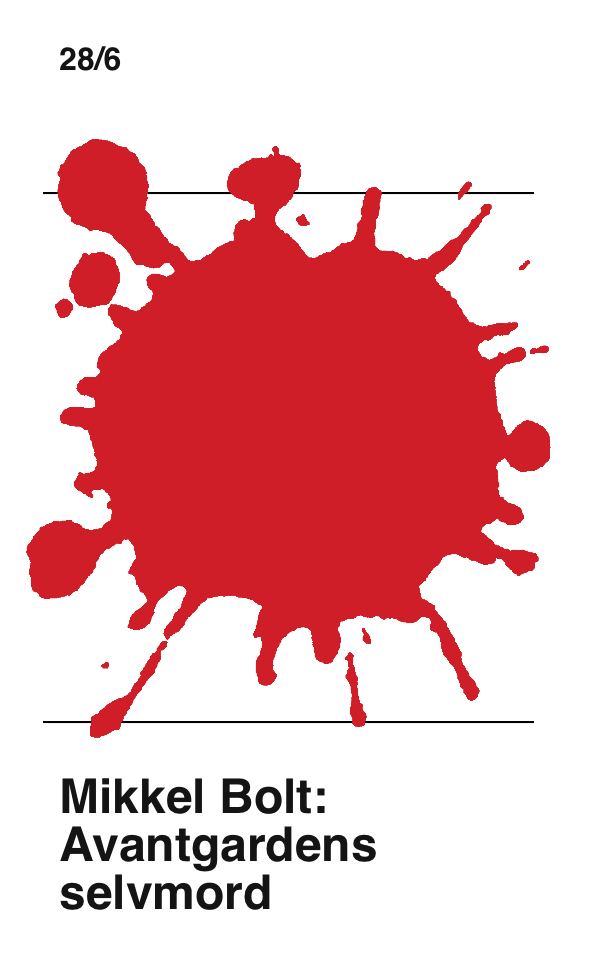Jacques Rancière: Aisthesis: Scenes from the Aesthetic Regime of Art (2011/2013)
Filed under book | Tags: · aesthetics, art, art history, art theory, body, cinema, dance, film, life, literature, music, painting, pantomime, philosophy, photography, poetry, politics, representation, sculpture, theatre, theory

Rancière’s magnum opus on the aesthetic.
“Composed in a series of scenes, Aisthesis–Rancière’s definitive statement on the aesthetic–takes its reader from Dresden in 1764 to New York in 1941. Along the way, we view the Belvedere Torso with Winckelmann, accompany Hegel to the museum and Mallarmé to the Folies-Bergère, attend a lecture by Emerson, visit exhibitions in Paris and New York, factories in Berlin, and film sets in Moscow and Hollywood. Rancière uses these sites and events—some famous, others forgotten—to ask what becomes art and what comes of it. He shows how a regime of artistic perception and interpretation was constituted and transformed by erasing the specificities of the different arts, as well as the borders that separated them from ordinary experience. This incisive study provides a history of artistic modernity far removed from the conventional postures of modernism.”
First published as Aisthesis : Scènes du régime esthétique de l’art, Éditions Galilée, 2011
Translated by Zakir Paul
Publisher Verso Books, 2013
ISBN 1781680892, 9781781680896
304 pages
via falsedeity
Reviews: Hal Foster (London Review of Books), Joseph Tanke (Los Angeles Review of Books), Marc Farrant (The New Inquiry), Ali Alizadeh (Sydney Review of Books), Jean-Philippe Deranty (Parrhesia).
Roundtable discussion with Rancière at Columbia (video, 43 min)
Selected interviews and reviews (in French)
Erwin Panofsky: Perspective as Symbolic Form (1927–) [DE, ES, EN]
Filed under book | Tags: · art, art history, art theory, geometry, image, optics, perspective, philosophy, theology

“Erwin Panofsky’s Perspective as Symbolic Form is one of the great works of modern intellectual history, the legendary text that has dominated all art-historical and philosophical discussions on the topic of perspective in the last century. This unrivaled example of Panofsky’s early method places him within broader developments in theories of knowledge and cultural change. Here, drawing on a massive body of learning that ranges over ancient philosophy, theology, science, and optics as well as the history of art, Panofsky produces a type of ‘archaeology’ of Western representation that far surpasses the usual scope of art historical studies.
Perspective in Panofsky’s hands becomes a central component of a Western “will to form,” the expression of a schema linking the social, cognitive, psychological, and especially technical practices of a given culture into harmonious and integrated wholes. He demonstrates how the perceptual schema of each historical culture or epoch is unique and how each gives rise to a different but equally full vision of the world. Panofsky articulates these distinct spatial systems, explicating their particular coherence and compatibility with the modes of knowledge, belief, and exchange that characterized the cultures in which they arose. Our own modernity, Panofsky shows, is inseparable from its peculiarly mathematical expression of the concept of the infinite, within a space that is both continuous and homogenous.”
First published in Vorträge der Bibliothek Warburg 1924-1925, Leipzig/Berlin: Teubner, 1927, pp 258-330.
Reprinted in Panofsky, Aufsätze zu Grundfragen der Kunstwissenschaft, eds. Hariolf Oberer and Egon Verheyen, 1974; Berlin 1992, pp 99-167.
English edition
Translated by Christopher S. Wood
Publisher Zone Books, New York, 1991
ISBN 0942299523, 9780942299526
196 pages
Review: E.H. Gombrich (NY Review of Books 1997).
Publisher (EN)
Die Perspektive als ‘symbolische Form’ (German, 1927/1980)
La perspectiva como forma simbolica (Spanish, trans. Virginia Careaga, 1973/2003)
Perspective as Symbolic Form (English, trans. Christopher S. Wood, 1991, no OCR)
Mikkel Bolt: The Suicide of the Avant-Garde (2009) [Danish]
Filed under book | Tags: · art, art history, art theory, avant-garde, capitalism, critique, politics, situationists, surrealism

“A book – essay, cultural intervention, and potential debate-cooker – whose aim is to outline the historical avant-garde’s road to extinction and to ponder on the loss of grander political ambitions in innovative art today.” (Jesper Olsson)
En kritisk analyse – med udgangspunkt i surrealismen, George Bataille (Acéphale), Situationistisk Internationale og mellemkrigstidens europæiske kommunistpartier – af avantgardens selvforståelse. Mikkel Bolt undersøger også, hvordan idéen om revolution tager sig ud aktuelt.
Avantgardens selvmord
Publisher 28/6, Copenhagen, 2009
ISBN 9788792529039
109 pages
via forlaget286
Reviews: Jesper Olsson (Nordic Journal of Aesthetics, 2010-2011, EN), Bendik Wold (K&K, 2010, DK).
Comment (0)
